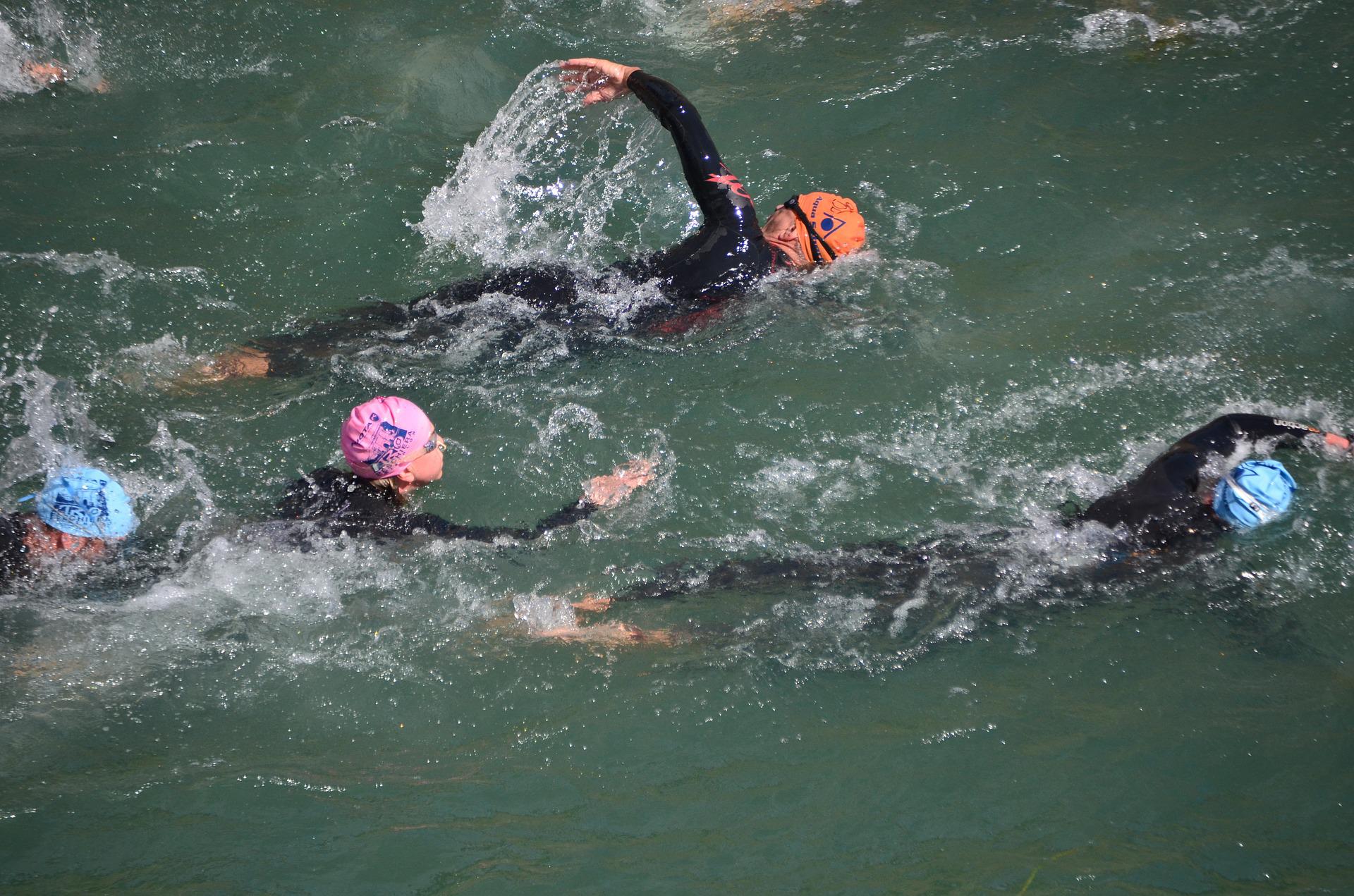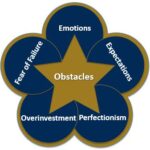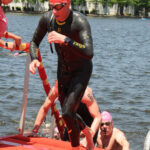The 2022 USAT Age-group National Championships in Milwaukee two weeks ago was supposed to be a triumphal follow-up for Miguel Mattox and Jenna Haufler, two of the top amateur triathletes in the U.S. with whom I work (both have given me permission to use their names and tell their stories) who absolutely crushed it at the 2022 USAT Multisport National Championships in Texas in late April (Miguel won 6 out of 7 national titles he raced for and Jenna went 2-for-2). Both of them entered the AGNCs with expectations to compete for the overall Olympic-distance title. Unfortunately, their Olympic distance races turned into, as the title of the Judith Viorst classic book aptly describes, a “terrible, horrible, no good, really bad day.” Jenna and Miguel each fell victim to injuries they had been recovering from that flared up during the run segment. And, to add insult to injury, though Miguel didn’t know it on race day, he had also contracted Covid. Both were forced to abandon their races while either leading or being near the front out of T2. Both of them left the event feeling disappointed, and, as these were the first DNFs of their triathlon careers, a little traumatized. For a review of what happened, I encourage you to watch “Psychology of a Bad Race” from their YouTube channel.
When I saw them after the race, both of them said, “I had a really bad day.” This statement was accompanied by a tsunami of thoughts and emotions that was neither pleasant nor helpful including frustration, anger, worry, doubt, and sadness. Over my many years as a triathlete and a mental coach, I have seen this reaction have a dramatic and traumatic impact on athletes’ psychology, as well as their subsequent training efforts and race performances.
Given the frequency with which I have heard this sort of judgment on a difficult race day and how much harm it does to triathletes, I wanted to explore it further in the hopes of finding a way to lessen its impact and even change how you evaluate and judge your future race experiences. Jenna and Miguel have graciously agreed to share their experiences and insights about their “really bad day” in the hopes that they can help others to see how “every race can be a good race.”
Good Races are Good
To be sure, a good race is not hard to miss and certainly always welcome. You feel ready to rock and roll when you wake up in the morning. You are mentally there in the lead up to the race: motivated, confident, energized, and focused. You put up good numbers (e.g., pace, wattage, HR) during the race. Most importantly, you swim, bike, and run really fast. And, as icing on the cake, you have a great race result. After the race, you’re super psyched and happy. As the saying goes, “It’s all good.”
Bad Race are Bad
Equally sure, a so-called bad race is also hard to miss and most certainly not welcome. When I asked some triathletes recently why they would make such a pessimistic assessment of some raced, several themes emerged from their most responses:
- Bad technique: “I swam like crap today.”
- Slow: “I couldn’t figure out why I was off my goal pace.”
- Mental: “My head just wasn’t in it today.”
- Feeling: “I felt a bit off today.”
- Physical: “I just had no energy today.”
- Not fun: “It was a slog getting through the day.”
In Jenna’s case, she woke up feeling good on race day, but there were a few things weighing her down as she approached the start of the race. First, her seemingly recovered calf injury was sending her signals that perhaps it wasn’t ready for a “full gas” effort. Second, in a race a few years ago, Jenna experienced heat stroke and unconsciousness after finishing in similar hot and humid conditions. As for Miguel, he had barely run in the last six weeks and his Plantar Fasciitis injury was definitely not completely healed. And, as I mentioned above, he woke up not feeling well due to the as-yet-undiagnosed Covid. In other words, the odds were stacked against them, physically and psychologically.
But Do Bad Days Have to be Bad?
All of the above statements seem to give good cause to conclude that “I had a really bad day.” At the same time, I would argue that such a discouraging conclusion is both inaccurate and decidedly unhelpful as you pursue your triathlon goals. The problem is that this perception of the quality of your race day is defined too narrowly in ways that prevent you from seeing the many benefits you get from a day that you might ordinarily decide was awful. In other words, it’s your perception of the race that makes it good or bad.
A bad race is usually based on how it compares to the expectations you had going into the race, particularly related to a specific result you wanted to achieve. If your expectations are very high, anything less than meeting that expectation will be seen as bad. We all go into races with high hopes of the “perfect” race, where everything clicks, you feel great, you are a rocket from start to finish, and you get the race result you had wanted. At the same time, as any experienced triathlete knows, the perfect race doesn’t exist; there are just too many variables in our sport that can turn against you. Moreover, the time you put up at the finish doesn’t always reflect all the good that can come out of a race.
Both Jenna and Miguel admitted that they went into the race with expectations, even if they didn’t want to admit it. Gosh, how could they not have expectations, both internally (their desire to go fast and continue their remarkable streak of race results) and externally (feeling a sense of responsibility—and a little pressure—from all of the support they receive from their 20,000+ social-media followers). At a conscious level, they openly tempered these expectations with a reality check of their current health and fitness, but expectations, which often exist unconsciously, were no doubt present and no doubt impacted how they evaluated their races following their DNFs.
Redefine a “Bad” Race
Let’s start with my one definition of a bad race: “When you turn against and give up on yourself.” That is the worst kind of race because it isn’t perceived as only a failure of the hoped-for race outcome, but as a failure of yourself. And there is nothing worse than feeling like you let yourself down because, even if the race beats you, it’s far worse for you to beat you.
These are the days that you need to broaden your definition of what constitutes a good race beyond feeling good, going fast, and getting the result you want. Having a good race can mean more than just a good result. For example, you might swim, bike, or run well, or nail your transitions. Miguel and Jenna started their races well and both looked like they were on their way to a great race leaving T2. Here’s an optimistic, and perfectly reasonable, perspective on their races: They both crushed the first four-fifths of the race (though, admittedly, Miguel knew there was something else going on because his #s were way off)! Plus, some good lessons came out of the last, less good, part of the race, which is another form of victory.
Additionally, a definition of a good race based on its outcome (or even finishing) ignores another piece of the “swim, bike, and run fast” puzzle that is essential to achieving your triathlon goals, namely, winning the mental race. On those so-called bad days, you have an incredible opportunity to become a better triathlete by strengthening your mind while everything else may be going to hell. And, if you think about it, for most of us, winning the internal race against ourselves is why we ultimately do triathlons.
Triathlon also involves a series of decisions that often determine your race: What pace do I swim, bike, and run; how much do I fuel and hydrate; do I go with the pack or stick with my plan; and sometimes, should I continue or stop? However painful a DNF might be, that is sometimes the best choice for your physical and mental health and well-being. You may bristle at this option because you consider yourself tough and you likely perceive that DNFing is a personal failure and a sign of weakness. Plus, there is always the fear that others will judge you to be weak as well. Yet, making this difficult decision actually takes courage and mental strength and, in fact, makes you stronger because the hard decision is often the right decision.
Jenna and Miguel, who are both incredibly determined triathletes and neither of whom had ever DNFed in a triathlon before, struggled with their decision to stop during the run, in the moment and after, questioning whether it was the right decision. I would suggest that, in fact, they listened to their bodies and made healthy decisions to end their races early, though they may be reluctant to embrace my perspective for the very reasons I described above.
Make Every Race a Good Race
I believe that “every race can be a good race.” My definition of a good race on days when you could easily define it as a bad race is: “You remain your best ally and you keep fighting until there is no more fight left in you.”
Let’s break that definition down a bit. First, on so-called bad days, it’s easy to go to the “dark side,” meaning you get negative, discouraged, and give up yourself. Instead, you can stay positive and motivated, and choose to keep fighting through the challenges, regardless of the disappointing outcome; on tough days, just crossing the finish line can be a victory. Practicing and ingraining this more constructive attitude is so important because you’re going to have a lot of those “bad” days in your triathlon career. And you can decide whether your Force is going to be with you or against you (apologies for the Star Wars references).
Second, I’m not asking you to say “I’m lovin’ it!” That’s just plain unrealistic given that there are plenty of good reasons why you aren’t loving it. At the same time, you can’t hate it because, if you do, you will probably give up and your race will have been a waste. You need to find a middle ground between the extremes of love and hate. That happy medium is to just “accept and deal,” meaning acknowledge that it’s going to be a tough day and decide that you’re going to get the most out of it you can. To use a Navy SEAL motto, “Embrace the suck.”
Third, those bad days are really uncomfortable, and they don’t feel good in any way; that’s why we automatically call them bad days. Yet, these days are great opportunities for you to get comfortable with being uncomfortable. These experiences are so valuable because there is a lot of discomfort in triathlon and the more you can experience and respond positively to the discomfort on those “bad” race days, the more prepared you will be to respond positively to the discomfort you will surely feel in future races. So, on those uncomfortable race days, you want to embrace, rather than give in to, the discomfort until the discomfort becomes, if not comfortable, at least manageable. In other words, you win the “race” against the dark side of you that wanted to give up.
Fourth, triathlon is a sport that is rife with difficult conditions including courses, weather, terrain, and water. Moreover, everyone in the field has to swim, bike, and run in the same conditions (I’ve never been in a race where the water was cold, the bike had a wicked headwind, and the run was all climbing just for me!). So, it’s not the conditions that matter, but rather how you perceive (threat or challenge) and react to them (give up or fight). Bad days are a great way to figure out how to swim, bike, and run your best (or just survive) in those tough conditions, so when you get to a future race with similar bad conditions, you have the attitude and tools necessary to respond positively to them, and you swim, bike, and run as well as you can.
Fifth, as I noted above, so-called bad days can trigger in you a plethora of unpleasant emotions such as frustration and disappointment, all of which can make those so-called bad days even worse. You have the opportunity to turn those emotions around and generate more positive emotions, such as pride and inspiration, that will keep you positive and motivated during the rough times in response to those “bad” days.
Finally, reinterpreting so-called bad days will make you a more resilient and adaptable triathlete. Resilience means you’ll be better able to respond positively to the always-present adversity of our sport. You will have a stronger mind for everything that triathlon (and life) throws at you every day.
With the initial shock and disappointment of their AGNC races having receded over the last several weeks, Miguel and Jenna have already put the races behind them and are focused on their next race goals and what they will need to get healthy and achieve them. Their shared passion for our sport has enabled them to weather a pretty rough experience that every triathlete can relate to. The lessons they have learned in seeing every race as a good race can help all of us to become more mentally stronger, swim, bike, and run faster, gain the most meaning, satisfaction, and joy from our triathlon experiences, and progress more quickly toward our triathlon goals. So, thanks to Jenna and Miguel for their willingness to make themselves vulnerable to help others.







